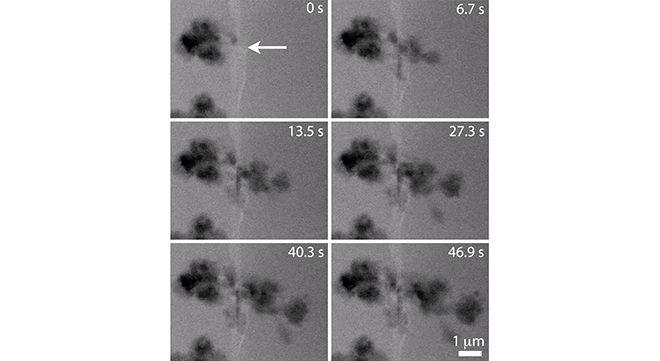Scientists at the DOE’s Oak Ridge National Laboratory have captured the first real-time nanoscale images of lithium dendrite structures in lithium-ion batteries. The ORNL team is confident that its research, published in Nano Letters, will be of great benefit to scientists who are experimenting with different ways to tackle the dendrite problem.
Dendrites form when metallic lithium takes root on a battery’s anode and begins growing haphazardly. As the dendrites grow, they can puncture the divider between the electrodes and short-circuit the cell.
The ORNL researchers studied dendrite formation by using a miniature electrochemical cell that mimics the liquid conditions inside a lithium-ion battery. Placing the liquid cell in a scanning transmission electron microscope and applying voltage to the cell allowed them to watch as lithium deposits grew into dendritic structures.
“It gives us a nanoscopic view of how dendrites nucleate and grow,†said ORNL’s Raymond Unocic, in situ microscopy team leader. “We can visualize the whole process on a glassy carbon microelectrode and observe where the dendrites prefer to nucleate and also track morphological changes during growth.â€
A video shows the process of dendrite growth.
The team was able to make precise measurements of the cell’s electrochemical performance. “This technique allows us to follow subtle nano-sized structural and chemical changes that occur and, more importantly, correlate that to the measured performance of a battery,†said lead author Robert Sacci.
“Usually when you run a battery over many charge-discharge cycles, you wait until things start failing and at that point you perform a root-cause failure analysis,†Unocic said. “Then you see there’s a dendrite – but so what? Now that we can see exactly how the dendrites are forming using our technique, we can be proactive and devise strategies for inhibiting or reducing these phenomena.â€
Source: ChargedEVs



